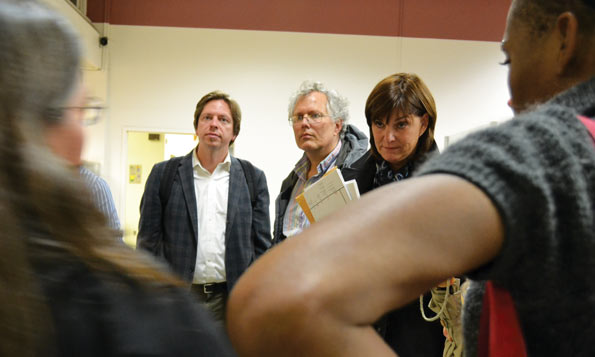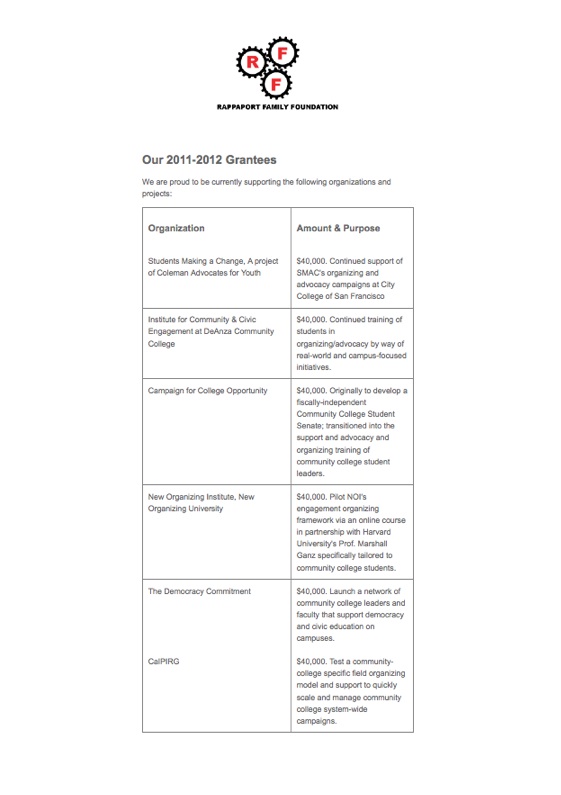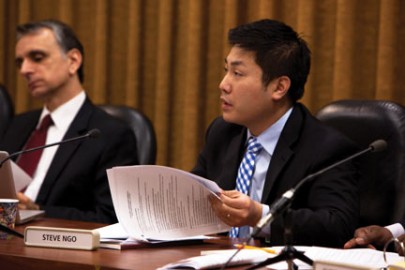Placement Test Politics
[showtime]
A three piece analysis investigating the battle on placement tests at City College
“Injustice!”: New Placement Plus One policy draws fire from student advocacy group Students Making a Change — a.k.a. SMAC. But what’s best for City College?
By Sara Bloomberg
The Guardsman
Formed at City College in 2010 by Lena Carew, a former student at the college, Students Making a Change has been involved in advocacy campaigns this semester from placement tests to free muni passes for students.
But alongside the victories, the group has been followed by a cloud of controversy.
Members of SMAC spoke passionately at the April 26 Board of Trustees meeting, when a controversial resolution on a new placement testing policy was up for a vote — and eventually passed.
“Some of the students are being paid to speak here,” accused Student Trustee Jeffrey Fang. “I think their voice is still valuable … but we need to take that under advisement.”
Chelsea Boilard, the director of programming for Coleman Advocates for Children & Youth, a community organization in San Francisco, confirmed there are eight student leaders at City College that are paid by the organization but declined to comment on the specifics of their employment.
Veronica Garcia, a City College student and Coleman Advocates’ SMAC Basebuilding Club Leader, said she gets paid $10 per hour.
According to the Rappaport Family Foundation’s website, they have given SMAC a $40,000 grant, through Coleman Advocates, for “organizing and advocacy campaigns at City College of San Francisco.”
One of the many private funders behind the controversial Student Success Task Force, the Rappaport Family Foundation seeks to encourage student activism and civic engagement at community colleges in California, according to their website.
Carew, Coleman Advocates’ SMAC Coordinator, who wrote the grant says that future funding is uncertain.
As a group, the students in SMAC tend to speak uniformly on issues when in public — like politicians-in-training — and two members, Marjory Ruiz and Juan Segundo, are designated as media representatives.
However, the group was unusually candid at their May 9 meeting.
At a SMAC student leader meeting held in the Ocean Campus Multi-Cultural Resource Center, the group talked about their summer plans and future goals, including increasing membership in the fall, networking with students at Peralta Community College and finding time to have fun.
In a solemn moment, Ruiz began to tear up as she discussed her plans for transferring to a four-year university in the fall.
She was accepted both UC Davis and UC Santa Cruz, she said, but alluded to family obligations that will prevent her from leaving San Francisco.
Carew encouraged the group to celebrate their victories, even amidst a contentious climate.
“It’s easy to get lost in these emotionally-charged conversations,” Carew said, but there is still much to be proud of, including the board’s vote to adopt the new placement testing programs.
One member wasn’t so sure.
The state already mandates that community colleges use multiple measures to assess students, Ruiz said. “Why am I celebrating a policy to enforce a policy that’s already there?”
The group voiced interest in meeting with English faculty over the summer to discuss implementation of the new Placement Plus One testing program, despite hard feelings that remain between SMAC and faculty after the April 26 board meeting.
During that meeting several SMAC members spoke passionately about the harmful effects of the placement tests used by the college and demanded that the new testing programs be implemented immediately.
“We cannot allow another generation of students go by and sit complacently … (watching the faculty) say, no, we’re gonna work on this until it’s perfect,” Marjory Ruiz said, referring to English faculty requests for more time. “Guess what? The system already is not perfect. It’s not working. We need to change this as quickly as possible.”
Faculty present at the meeting objected to being told work over the summer, as their contracts don’t include summer session.
Academic Senate President Karen Saginor and English department chair Jessica Brown both agreed to an amended resolution, which called for full implementation by Spring 2013, giving faculty and matriculation officers an extra semester to prepare.

Emotions remained high, even after the amended resolution passed.
Students from SMAC, as well as representatives from both Coleman Advocates and Bridge to Success, a program which promotes college success for underrepresented students, were visibly upset — even livid.
SMAC members, accompanied by Pecolia Manigo, the education justice/education policy campaign organizer for Coleman Advocates, confronted Student Trustee Fang about his comment that the students were paid to attend the meeting.
Fang told The Guardsman that Manigo said to him that he “should have talked to SMAC first, instead of speaking in front of the microphone.”
And according to a press release dated April 27 on Coleman Advocates’ website, “While students were testifying at last night’s hearing, there were teachers in the audience who actually told them to ‘sit down,’ in an effort to undermine their voices and their experiences.”
However in a telephone interview with The Guardsman on May 1, SMAC’s media representatives said that they didn’t feel disrespected at that meeting.
Juan Segundo was asked to sit down after he tried to address the Board for a second time during public comment. Board President John Rizzo explained that each speaker is only one allowed one two-minute comment period.
Veronica Garcia also approached the podium after public comment was closed and Rizzo reminded her she could not address the board at that time.
Someone from the the audience said, “Sit down, it’s okay,” and Garcia returned to her seat.
Later in the meeting an outburst from a faculty member in the audience triggered angry reactions from members of SMAC.
After Trustee Ngo began to rant about his disgust with requests by English faculty to delay implementation, Paolo Sapienza, a matriculation officer, said, “Shame on you. This is (time for) board discussion. Don’t talk to us.”
Students responded to Sapienza with “Shame on you” and “you’re racist” but the exchange quickly ended when Rizzo called for order.
English faculty members then left the room and students applauded as Ngo waited to continue his speech.
In a seeming contradiction, on previous occasions Ngo has condemned what he describes as highly political and emotional rhetoric that hinders productive conversations.
Only a couple weeks earlier on April 12, the Board’s Institutional Effectiveness Committee met to discuss the placement testing proposals that they eventually endorsed at the regular meeting on April 26.
A thunderstorm raged outside of the Gough Street campus, as members of SMAC, accompanied by Hal Huntsman, a math faculty member and their advisor, as well as Sue Homer, a political science instructor, got into a heated argument about placement test policies and the process of shared governance with several English faculty members.
Trustee Fang stood on the sidelines of their circle.
By the end of the discussion, Fang suggested that he mediate a discussion between the two sides, at a later time, to “clear up any miscommunication.”
They all half-halfheartedly agreed.
“We agreed, we shaked on it,” Fang said, but the meeting never happened.
As nearly everyone at the meeting that night left, SMAC remained in the hall along with Huntsman and Homer. Eventually, they were joined by Steve Ngo.
Fang was nearby, and while he could not see the group, he was shocked by their conversation.
The group discussed the proceedings at the meeting, Fang said, making fun of anyone that they considered opposition, including calling English Chair Jessica Brown a liar and mocking English instructor Jeffrey Liss for defending Brown while holding her purse.
Fang said that Homer responded to the students and said, “This is what we do at City College. We lie.”
The Faculty ask, ‘what about us?’
By Thomas Figg-Hoblyn
The Guardsman
English department chair Jessica Brown wrote in her comment that the “bullying and the political posturing has got to stop. It is creating a hostile work environment.”
Kleinman wrote that “Ngo has abused his position as a trustee and has abused too many faculty in the process. Claiming that one is for ‘justice’ does not give that person license to overstep bounds, intrude upon academic operations, make gross generalizations about the curriculum, and manipulate a very loud student minority in order to further his political career.”
A student, Mae White, who signed the petition wrote, “I watched the video of the board meeting for extra credit in my political science class, and Ngo and his supporters committed just about every logical fallacy we learned this semester in my philosophy class.”
Another student, who signed the petition anonymously wrote, “Ngo should quit fighting professors and fix summer school instead.”
According to the petition, in addition to belittling the faculty, Ngo has chosen to represent a select few rather than a broader cross-section of the college community.
The “select few” refers to Students Making a Change, a student organization led by an outside nonprofit, Coleman Advocates, which trains SMAC leaders in recruitment. SMAC is also financially supported by a grant from the Rappaport Family Foundation.
During the board meeting Student Trustee Jeffery Fang, brought up the point that SMAC activists are paid, and may not necessarily represent the voice of the student body.
Chelsea Boilard of Coleman Advocates said that eight members of SMAC are paid by the organization.
The Rappaport Family Foundation financially supports SMAC and, according to their website, has provided $40,000 to support their organizing and advocacy at City College.

The student club is guided by Sue Homer of the social sciences department. She is often seen teaching SMAC members on campus and is present at all meetings where they demonstrate.
According to the Coleman Advocacy website, Homer was the SMAC faculty advisor.
The Board v. Faculty
The contentious April 26 Board of Trustee meeting was one of many skirmishes in a long-running struggle between faculty and board members regarding who has authority to make changes to academic curriculum, placement and testing.
The feud began in early 2010.
In response to a Feb. 25, 2010 draft resolution, “Recommendations on the Achievement Gap and Equity,” co-sponsored by Trustees Jackson, Marks, and Ngo, the Academic Senate approved a resolution at their March 23, 2010 special meeting, chiding the board for making academic recommendations out of the scope of their administrative role and for not going through shared governance.
The Academic Senate resolution cited Assembly Bill 1725, signed by Governor George Deukmejian in September of 1988, and the state education code, which states that community college faculty have primacy in academic and professional matters and that they alone have the professional qualifications, expertise, and experience to establish and implement initiatives.
Faculty requested the trustees strike all references to academic issues from the board’s achievement gap and equity resolution, including placement test changes, and instead focus on the administrative aspects of of the resolution.
The two groups have been at odds ever since.
English teacher Carol Fregly said the trustees, primarily Steve Ngo, had attacked faculty during a 2010 Board of Trustees meeting, accusing them of being racist.
“I suspect that Ngo and Homer worked with SMAC to reintroduce and secure footing for the Board of Trustee’s plans, including placement test changes,” Fregly said.
SMAC students seem to have their hearts in the right place as they work to empower the minority student body and make education more accessible for minorities, and to improve the success of minority students.
But faculty and Academic Senate members know all too well that SMAC members can be intimidating. They boo and hiss towards faculty, and recite their rehearsed political statements loudly during public meetings, sometimes using strong words like liar and racist.
Classes have been drastically cut, funding has been cut more than any time in history, teachers are overworked and underpaid, and the SFUSD recently announced that it needs to cut teachers’ salaries and benefits by $30 million.
One may ask why Coleman Advocates, the mayor’s office and the San Francisco Unified School District, who were all present in support of SMAC at the April 26 board meeting, are spending so much effort to focus on one item — college placement testing — when the public education system as a whole is in shambles.
Trustee Steve Ngo takes a stand
By Joe Fitzgerald
The Guardsman

If SMAC is the wedge pushing through the new “Placement Plus One” program at City College, then Board of Trustees member Steve Ngo is the hammer.
Ngo’s push for the program was integral to its passage. Ngo was one of a block of three trustees who often, though not always, vote in lockstep with one another: Milton Marks, Chris Jackson, and himself.
Board President John Rizzo was the wild card, and with only Natalie Berg and Anita Grier opposing, the decision was already three to two before the vote was even taken.
NATURAL ALLIES
Ngo’s part in the passage of the program goes past his role in the boardroom. He often meets with members of SMAC after board meetings to debrief with them.
“SMAC and I are natural allies. I was them. My wife was them. My wife was a City College student,” he said in a recent telephone interview. He repeated the sentiment at the recent contentious board meeting where the placement test policy passed.
There is no doubt that Ngo feels strongly about student equity. But empathy may not be his only motivation in allying with SMAC.
The Guardsman asked if it was improper to have a select group of students who consistently speak behalf of policies he backs at board meetings. Ngo replied that in the board split, Berg has her own allies in the Academic Senate, and that the same group of faculty would rebut him time and time again. “They all have allies, on the board,” he said.
Building allies and political allegiances is the name of the game in politics. But in this scenario, students are being coached and recruited by respected professionals who they trust in the classroom, who lead SMAC.
SMAC advocates for many policies that would benefit students, but operate in a shroud of secrecy. They frequently rebuff reporters with canned phrases such as “we need time to process this information,” and “I cannot speak for the group, you’ll have to ask the group.”
When Guardsman reporters, who are students, stopped in to observe a SMAC meeting in order to speak with the group, we were told to leave by the club leader Lena Carew (who is no longer a City College student, but attends CAL), and that the meeting was private and were told to leave. The Guardsman reporters then cited Inter-Club Council code that recognized club meetings as open to all students, rules pointed out to us by Dean of Student Activities Samuel Santos.
SMAC is also funded by a private non-profit advocacy group, Coleman Advocates.
Dean Santos said that there are no City College rules that prohibit student clubs from receiving funds from outside groups but said it is highly unusual; he is currently investigating the ramifications of the dual funding.
Ngo sees no problem with their dual funding. He argued that faculty and staff have ample time to learn how to navigate school politics, allowing themselves to be forceful advocates on their own behalf. If students are being paid to advocate, it helps free up their time to become better at the political game by learning the ins and outs of the system, he said.
It was that system that seemed to agitate Steve Ngo the night of the vote on Placement Plus One.
ROLE MODELS
SMAC students gave impassioned speeches during public comment on April 26. Ngo followed suit. He ripped into English department faculty, who were requesting implementation in spring 2013 instead of fall 2012.
Ngo’s statements began kindly enough, as he responded to the multitudes of people that came up to speak during public comment. .
“The problem with our discourse is it’s very toxic, very partisan and very political. I’ll take some ownership of that,” he said.
Then he started to get personal.
“It’s easy to say to a student that they can wait. It’s not your life, it’s their life. The stakes are just higher for them, than they are for you. It’s a fact,” he said, and his voice started to raise. “You have a job, you will grade papers, you will lecture, and in the meantime, these students will wait another year to endure a policy you know is failing. Why are they sacrificial?”
“Shame on you,” shouted Paolo Sapienza, a matriculation officer, interrupting Ngo. “This is board discussion, don’t talk to us that way.”
Ngo stopped speaking, and SMAC students started shouting “shame on you” right back. One student shouted, “this is my life,” as the SMAC students all began to shout down Sapienza.
Trustee Ngo is currently running in the November election to retain his seat on the Board of Trustees.

![timeline_cutout[01]](https://theguardsman.com/wp-content/uploads/2012/05/timeline_cutout01-1024x173.jpg)
Comments are closed.